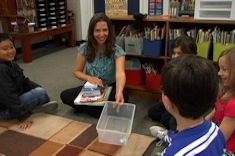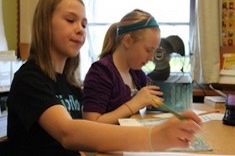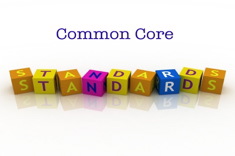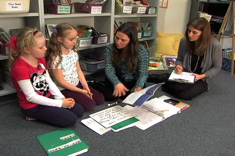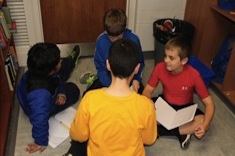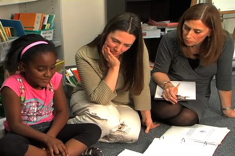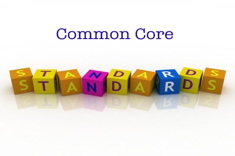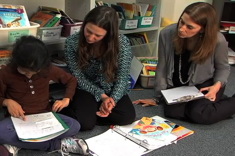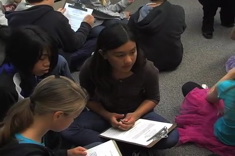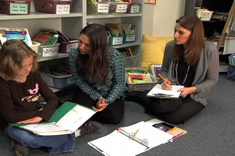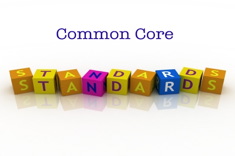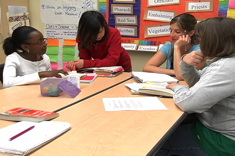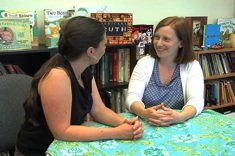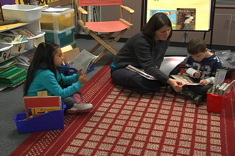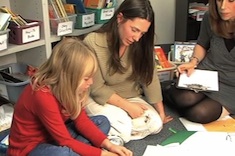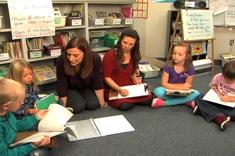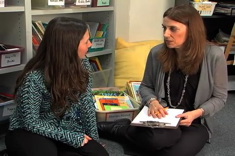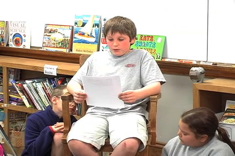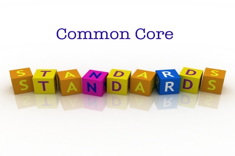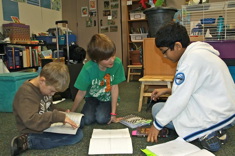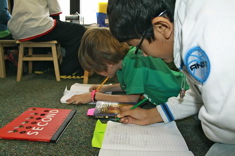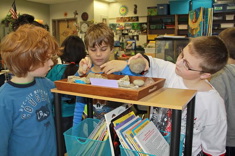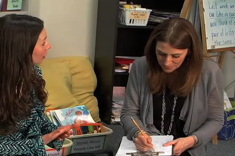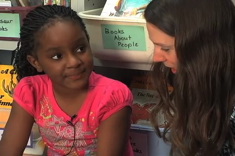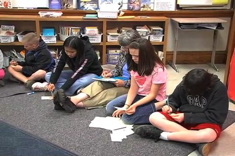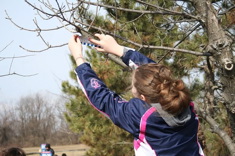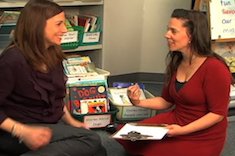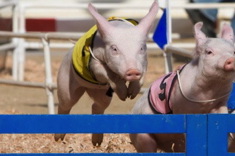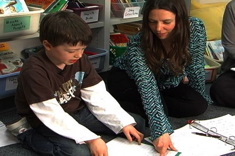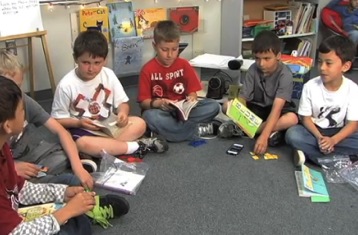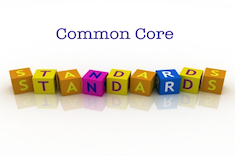Heather Rader
Heather has a fascination with what makes teaching and learning work. Her motto is “Stay Curious,” and she embraces that in her personal and professional life. She teaches fourth grade.
Latest Content
Teaching Revision Strategies: Introduction and Modeling
Heather Rader shares a process for teaching peer editing and revision skills that helps students learn how to assist each other kindly during writing workshop. This is the first video in a three-part series.
Teaching Revision Strategies: Partner Work
Partners confer over revision in fifth grade in this second installment of a three-part video series.
Second-Grade Reading Group
Heather Rader demonstrates the importance of a varied reading diet to a second-grade group, sharing her own stack of books.
So You Think You Can Combine Sentences? You Can!
Heather Rader concludes her series on sentence combining with a four-step process to help teachers explore the sentence combining craft on their own.
Sentence Combining in Workshops
Heather Rader has strategies for using sentence combining in literacy workshops.
A Tool Worth Exploring: Sentence Combining
Heather Rader begins a new series on sentence combining, an alternative to traditional drill and kill grammar instruction.
Word Nerds
What words are worthy of study? Amanda Adrian and Heather Rader explore that question with colleagues.
Subheading Literacy: Nothing “Sub” About It
Heather Rader discovers subheadings are a neglected but useful tool for teaching students about key topics in their writing.
Symbiosis: Choice and Structure in Writing Workshops
Ruth Ayres and Heather Rader draw on their work as literacy coaches and teachers to explore the complex connections between choice and structure in writing workshops.
Research IS the Project (Primary Research Series)
Heather Rader blurs the line between research and presentation in the final installment of the primary research series.
KLWL: Ordering Research (Primary Research Series Part 3)
Heather Rader looks at the importance of frontloading information for young learners in the third installment of the primary research series.
The “Tys” of Student Research: Safety and Credibility (Primary Research Series Part 2)
Heather Rader shares the second installment in our primary research series.
Putting the Search Back in Research
Heather Rader launches a new four-part series on teaching research skills in the primary grades. This first installment highlights search techniques for children.
Transitions Are Like Underwear
If you tell students transitions are like underwear, they sit up and pay attention. Heather Rader uses the analogy to help students analyze and improve the transitions in their writing.
From “Show Me the Lessons” to Sustainable Planning (Part 4 of the Opinion/Argument Writing Series)
This is the final installment in Heather Rader's series on argument and opinion writing in the intermediate grades.
Touchy Topics for Opinion/Argumentative Writing
When students take a stand in writing, they will almost inevitably bring up touchy topics. Heather Rader considers the challenge in part 3 of her opinion/argumentative writing series.
Thank You For Arguing
In the second installment of our teaching argument/opinion writing series, Heather Rader uses a continuum dialogue and modeled writing with intermediate students.
Bully Literacy
Heather Rader shares texts for building understanding about bullies.
I Love a Good Argument
As Heather Rader works with teachers and teams on opinion/argumentative writing, she’s considering the anatomy of an argument and engaging ways to teach it.
Informational Snapshot Writing
Heather Rader finds web video is a powerful tool for scaffolding young writers as they produce informational texts.
Conferring for Conventions (Conventions Series Part 5)
Heather Rader gives examples of convention conferences in this final installment of the conventions series.
Aligning the Common Core and Conventions Instruction (Conventions Series Part 4)
Heather Rader works with a team of intermediate teachers as they connect their plans for conventions instruction and the Common Core.
Between Inquiry and Instruction (Conventions Series Part 3)
Heather Rader works with a team of intermediate teachers as they pore over student work together and analyze which conventions should be taught.
What Matters? Teaching Conventions Series
Heather Rader works with a team of intermediate teachers to ferret out what does and doesn’t work, based on research and experience.
Good News: Your Teacher is Calling
Heather Rader and Jennifer Taft share strategies for positive communication with parents.
Concise, Conversational, and Consistent: Explaining the Work of Literacy Coaches
Heather Rader shares the language she uses to describe literacy coaching to others.
Finding a Fit (The Power of Conventions Series)
Heather Rader works with a teaching team as they integrate conventions instruction into their writing workshop.
The Power of Music
What can music add to the classroom? Plenty! Sean Moore and Heather Rader provide many examples and favorite tunes.
Introducing the Common Core Standards in Writing (Part 2)
Heather Rader shares more guidelines for a professional development day on the Common Core with a writing focus.
Introducing the Writing Common Core Standards: Planning for Professional Development
Heather Rader sorts through goals, audience, and interest in planning a day of professional development linked to the writing standards in the Common Core.
The ABCs of Literacy Coaching (Part 1)
Heather Rader shares the essential elements of successful literacy coaching in this first installment of a month-long series.
Listen In: Strategies for Using Nonfiction Texts in Writing
The line between copying and plagiarizing can be a difficult one for young students to understand. In this video, Heather Rader and Linda Karamatic share a humane strategy for helping two second graders craft nonfiction writing.
What is the Content for Small-Group Instruction? (Part 2 of the Grouping Series)
Heather Rader considers how assessments and observations might be used to create flexible groups.
Listen In: About the Author
“About the Author” blurbs are a great way to bring closure to writing in workshops. In this “Listen In,” Myia begins to construct her “About the Author” page.
Listen In: Writing Reviews
Heather Rader uses Kincaid’s intricate system for analyzing books to build a writing agenda in this writing conference.
Extreme Makeover: Revision Edition
Heather Rader finds short text and shared modeling of revision strategies are just the scaffolds students need to see the power of revision for improving writing.
Listen In: Maya is a Chapter Writer
Some young writers take a lot of time and encouragement on the journey to uninhibited prose, while others zip to prolific. Maya is such a writer. Heather Rader assists this proficient 2nd grade writer as her teacher observes.
Common Core Conversations: Text Complexity
Amanda Adrian and Heather Rader find ways into understanding text complexity with students and teachers.
You’ve Got to Be Joking
A first-year teacher struggles to manage a class with boys who are cut-ups. From the lemons to lemonade department, Heather Rader helps him build on student strengths by developing a popular writing unit on joke writing.
Listen In: Writing in Math
Heather Rader confers with 2nd grader Maya about her math writing as Linda Karamatic listens in.
The Sponge Summary Lesson Part 5
In this sequence of videos, Heather teaches a 4th grade class, using the analogy of a sponge to explain how summaries work. In this fifth video, Heather and students shift from “I do” to “we do” as students try test their summary writing skills with partners
The Sponge Summary Lesson Part 6
In this sequence of videos, Heather teaches a 4th grade class, using the analogy of a sponge to explain how summaries work. In this final video, Heather and students debrief and capture their learning in writing.
Listen In: Knowing When You’re Done
When is writing finished? Heather Rader confers with a second grader over that age-old question for writers as Linda Karamatic listens in.
The Sponge Summary Lesson Part 1
In this sequence of videos, Heather teaches a fourth-grade class, using the analogy of a sponge to explain how summaries work. In this first video excerpt, Heather reviews the work the class has already done on understanding the attributes of good summaries.
The Sponge Summary Lesson Part 2
In this sequence of videos, Heather teaches a fourth-grade class, using the analogy of a sponge to explain how summaries work. In this second video, Heather presents the powerful analogy of a sponge for summarizing.
Best Practices in Spelling Instruction
Heather Rader wades through the research to find the best practices in spelling instruction.
Common Core Conversations: Using Evidence From Text
Amanda Adrian and Heather Rader explain how the standard for finding evidence in texts might change instruction.
How Do We Structure Small Groups? (Part 3 of the Grouping Series)
Heather Rader synthesizes recommendations and provides examples of how grouping structures work in classrooms.
The Sponge Summary Lesson Part 3
In this sequence of videos, Heather teaches a 4th grade class, using the analogy of a sponge to explain how summaries work. In this third video, Heather and students cull down a text into the important points needed for a summary.
Mentor Texts for Nonfiction Writing
Beth Lawson and Heather Rader meet to plan and share mentor texts for nonfiction writing in Beth’s fourth-grade classroom.
How Do We Know Small-Group Instruction is Effective?
Heather Rader considers how to assess the effectiveness of groups.
The Sponge Summary Lesson Part 4
In this sequence of videos, Heather Rader teaches a 4th grade class, using the analogy of a sponge to explain how summaries work. In this fourth video, Heather and students discuss their summaries in progress
Listen In: Magnifying a Moment in Writing
Sometimes using a prop can help young students understand a revision strategy. Heather Rader helps second-grader Sammi understand how to “magnify” a moment when revising her writing.
Listen In: Spelling Aids in the Writing Workshop
Many commercial aids are available to assist young writers. The challenge is choosing carefully, and integrating them into workshops in a way that doesn’t inhibit student fluency and risk-taking. In this video, Heather Rader confers with a second grader, demonstrating how to use a spelling log for high-frequency words.
The Affect of Tech on Splrs
Heather Rader considers the cultural divide between teachers and students who are “screenagers” when it comes to texting. If u r getting LOLed out in ur classroom u might want 2 read this.
Using Video to Build the Home-School Connection
Video is a terrific tool for building connections between home and school. Heather Rader explains how Kelli Demonte uses video to guide children and communicate with families.
When It’s Time to Abandon Your Writing
Writers in the real world abandon drafts all the time, yet it’s a strategy which isn’t often encouraged in classrooms. Heather Rader considers the thorny issue of how teachers can promote this strategy, yet still deal well with those students who never finish any drafts.
Teaching and Assessing Persuasive Writing Skills
Heather Rader explores different ways into persuasive writing with teachers and students, highlighting the importance of helping students learn to cite and quote expert resources
Grouping: Who? How Big? How Often?
In this first installment of a series on grouping, Heather Rader considers size, composition, and frequency.
Common Core Conversations: Vocabulary
Amanda Adrian and Heather Rader explore connections between the Common Core and vocabulary instruction.
Voila! Best Writing and Entry Slips in Second Grade
The word voila in French literally means “see there.” Linda Karamatic puts time and reflection into creating a binder, or “voila book,” that will ease the bulging writing workshop folders and preserve the best of her second-grade students’ writing.
Common Core Conversations: Reading in the Disciplines
Amanda Adrian and Heather Rader look at reading across the disciplines within the Common Core.
Communicating with the Y Chromosome
Heather Rader finds herself coaching a male teacher who is part of a male teaching team, and gets a lesson herself in gender communication patterns.
Current and Cocoa: Mixing Social Studies and Literacy
Current and Cocoa is a fun routine for integrating social studies, literacy, and conversation in classrooms. Heather Rader describes how the weekly activity builds community and fosters awareness of news events.
The Superpower of Reflecting
Are you more of a Pollyanna or Eeyore reflector? Heather Rader takes you inside the questions that help us reflect even more deeply on our instructional practices.
What’s the Evidence?
Heather Rader shares her experiences working with a teacher team led by an outspoken leader. With listening and support, the team examines evidence in a new way.
Preserving Student Writing as a Curator
Once students are producing quality writing, there is a new challenge: what to do with it all? Heather Rader works with a teacher to design a system to meet her needs.
Spelling Rules — Or Does It?
Heather Rader introduces a new spelling series and maps out the topics she’ll be tackling.
Three Rules Worthy of Spelling Inquiry
It seems like every spelling rule has an exception — so which ones must be taught? Heather Rader shares the three spelling rules worth any teacher’s time.
Sense of Little Engines
Heather Rader writes about "agency" – the challenge of letting students and teachers take charge of their learning. In concrete examples from a third-grade classroom and a professional development scoring session with teachers, Heather shares the subtleties of learning to trust, wait, and celebrate when learners of any age are responsible and independent.
Coaching Reluctant Writers
Heather Rader describes how to use "wows and wonders" to reach students who say they hate to write.
Prewriting is a Party!
Sometimes the most important work for writers takes place before any actual drafting. Heather Rader shows how a simple metaphor can help students understand the importance of planning and organizing drafts.
Coaching for the Test
Two teachers are disappointed in student assessment results, but they have very different approaches to tackling the problem. Heather Rader shares her role as a mentor in assisting her colleagues.
Coaching Monkey
Heather Rader has advice for literacy coaches looking for honest appraisals of their work from colleagues.
Off the Beaten Professional Development Path: What I Learned from the Teachers as Writers Group
Teacher writing groups are a wonderful informal way for teachers to get together over the summer voluntarily. Heather Rader has format suggestions, as well as tips for helping your group run smoothly.
Not That Into Me
If you're a literacy coach, those teachers who don't want to work with you can make you feel like the wallflower at the prom or the last kid picked for the basketball team. Heather Rader has positive, proactive suggestions for making the best of an awkward situation.
Writing Drafts and Stamina
Stamina is a term we use often in literacy instruction, but it can be tricky for students and teachers to define in classroom contexts. Heather Rader looks at the specific attributes of writing stamina, as well as how to model it for students.
An Attitude of Gratitude
Heather Rader gets three nasty emails, and thinks through how to hold on to an attitude of gratitude when dealing with colleagues who are short-tempered or demanding.
Writing Triage: Dealing with Dialogue Disasters
Is there a dialogue doctor in the house? If your students’ writing is filled with dull exchanges, you’ll enjoy these lesson suggestions from Heather Rader.
Grammar Insecurity: Coaching Editing
By the intermediate grades, many students are fluent writers, but they still need a tremendous amount of help with conventions. Heather Rader writes about how teachers' insecurities about their own skills can get in the way of instruction. She also provides some practical tips for assessing and teaching grammar based on emerging student needs.
Transitioning to Guide on the Side: Facilitating Collaborative Scoring
Heather Rader wants to transition to more of a guide-on-the-side role as she coaches colleagues. Here are some simple strategies she uses to move offstage during collaborative scoring workshops.
A Class with More Boys Than Girls
Heather Rader coaches a teacher who considers her boy/girl ratio and how it may be affecting students' understanding of directions and time on task.
How to Look at Student Work
With summaries as an example, Heather Rader uses trends from learners to help make smart instructional decisions about what is presented during whole group, small group and individual time.
Lesson Structure: Building a Strong Foundation
Stepping back to think about the design of quality instruction is essential for any teacher. Heather Rader looks to brain research and tried-and-true practices to lay out lesson components.
Common Core Conversations: The Half ‘n’ Half Shift for Nonfiction Reading and Writing
Colleagues and coaches, Amanda Adrian and Heather Rader, explore the upcoming shifts in English Language Arts and anticipate what it will mean for leaders, teachers and most importantly, students.
Virtually Coaching a Lesson
Coaching cycles look different depending on teachers' needs. Via email and phone, Heather Rader has professional conversations with a teacher as he plans and designs a lesson for observation.
Ubiquitous Venns, Watch Fors, and Leverage Points: Coaching for Depth
Heather Rader examines the use of Venn diagrams as a catalyst for thinking about how to coach for more depth in classrooms.
Math, Writing, and Coaching to Learn
Heather Rader works with a 5th grade teacher to infuse more writing into her math curriculum.
Procedural Writing in Math
Heather Rader explains how mentor texts for math instruction need some specific attributes.
What Velcro Can Do: Science, Literacy and Coaching Connections
No time for science? Don’t like messes? Heather Rader works with a teacher and helps her find a way to fit science neatly into her full teaching day.
Making Connections as a Reader and a Scientist
Heather Rader finds that reading is at the heart of scientists’ work.
Supporting Successful First-Year Coaches
Heather Rader gets the inside word from novice literacy coaches about the support they need to thrive.
Injecting Writing into . . . Everything: Ellipsis Stories
"DOT DOT DOT" – a phrase made famous in Mama Mia, it's also the spark for some writing instruction linked to read alouds from Heather Rader.
Injecting Writing into Everything: Prediction Stories
What happens between kindergarten and upper elementary grades to make students more hesitant about making predictions? Heather Rader has books and teaching suggestions for building prediction skills.
Injecting Writing into Everything: Cover-up Stories
Cover-up stories involve removing illustrations to heighten awareness of other story elements. Heather Rader explains how the instructional technique works.
Coaching Out of Chaos: Helping New Teachers Establish Management Systems
The #1 issue for many new teachers is management. Heather Rader shares how she tactfully assisted a novice teacher who needed help.
Calendaring a Literacy Coach
The joy and challenge of literacy coaching is creating a good structure for the day. Heather Rader has suggestions for short- and long-term planning on the coaching calendar.
Pencil Plans
The care and use of the lowly pencil in classrooms says a lot about what we value and our relationships with students.
Who Rules?: Creating a Classroom Code of Conduct with Students
Heather Rader works with a young teacher to establish a better management system.
The Email Mirror and Literacy Coaching
Are you a minimalist when it comes to email, or do you tend to send rambling and reflective posts? No matter your email style, it likely is a match for some of your colleagues, and a barrier to communication for others.
Helping Children Build Notetaking Skills
Whose job is it to teach notetaking skills? Heather Rader finds teachers often expect colleagues in previous or subsequent grades to teach these skills, as well as a lot of hesitancy about how best to instruct students. She presents a simple notetaking template and describes how she uses it to help students learn how to list important details with words and images.
Injecting Writing into Everything: Bringing the Outside In
Heather Rader helps a 3rd grade teacher break through the resistance of some student writers. The magic tool? A dirty onion from the garden.
Language Patterns: Reflecting with Transcripts and Wordle
If you are familiar with Wordle, you already know it is a great free tool on the web for creating “word clouds” – visual representations of language. Heather Rader uses Wordle in her literacy coaching to give new and veteran teachers a succinct and powerful visual representation of their teaching language.
Coaching Codes
A code of conduct is created to outline the standards and rules of behavior that guide an organization. Effective codes spell out “unspoken rules” as well, so that everyone can be successful. Heather Rader thinks through what a useful code for coaches might look like.
Writing Do-Overs: ERPs in the Classroom
ERP. The sound can't help but make you grin. It's Heather Rader's acronym for Explicit Revision for Peers, a series of one-minute kinesthetic writing routines to help students learn how to help each other kindly during writer's workshop.
You Get What You Ask For: The Art of Debriefing
Heather Rader explores the fine art of asking specific questions during coaching debrief sessions.
Learning from Coaching Mistakes
Inventors understand that early prototypes inform them best about what doesn't work rather than what does. But what about when prototypes are people? Heather Rader reflects on risk-taking, failure, and learning as a literacy coach.
A Coach’s Perspective: Is Sarcasm in Style This Season?
When is sarcasm appropriate in classrooms? Never, yet more is popping up all the time in schools, even from teachers. Here is some advice for dealing with sarcasm.
How to Use a Coach: Four Things to Consider
Teachers, are you getting the most out of your relationships with the literacy coaches and other mentors in your midst? Heather Rader has some thoughtful back-to-school advice for building more powerful teacher-coach relationships
How to Be of Use: Starting Strong
Heather Rader offers sage advice for coaches who want to be of use. Using a mnemonic device—”Peppers make cats cry”—you’ll be ready to start the year strong.
A Coach’s Perspective: No More Flying Pig Prompts
Heather Rader has advice for literacy coaches dealing with teachers who rely too much on writing prompts.
Sarcasm Is a Useful Teaching Tool — NOT
How does sarcasm hurt students? Heather Rader counts the ways.
There’s Been a Misblunderstanding
We're teachers and we have a tendency to talk too much. Heather Rader explains how she coaches a teacher through the problem.
Getting and Giving Student Feedback
How can we help students be more reflective in our classrooms, giving us the feedback we need to make them better places for learning? Heather Rader has suggestions.
The Over-Prompting of Young Writers
Heather Rader shares strategies teachers at any grade level can use to become more thoughtful and flexible in their use of prompts.
A Sponge is a Summary
Heather Rader shares a concrete analogy that students (and teachers) love for understanding how summaries work.
Wii Summary
Heather Rader coaches a 6th grade teacher as she helps her students write better summaries.
Listen In: Jeffry’s Ocean Story
Moving a child from simple to complex sentences is the goal in this second-grade writing conference.
Boys’ Book Club in Second Grade
In this video from Linda Karamatic’s second-grade classroom, boys discuss the book Fudge using the protocol provided by Linda.
Common Core Conversations: Increasing Argumentative Writing
Teachers continue to puzzle over and sort through the terminology in the Common Core related to opinion and persuasive writing. Amanda Adrian and Heather Rader consider terms and teaching strategies.
Browse Content By
Type
Category
- Assessment Tools
- Big Fresh Archives
- Booklists
- Choice Numeracy
- Classroom Design
- Common Core
- Community Building
- Conferring
- Content Literacy
- Digital Literacy
- English Language Learners
- Equity
- Family Relations
- Free Samples
- Guiding Groups
- Leadership
- Literacy Coaches
- Mentor Texts
- Minilessons
- New Teacher Mentors
- Podcasts
- Poetry
- Quote Collections
- Reading Strategies
- Self Care
- Struggling and Striving Learners
- Talking and Listening
- Teacher Study Groups
- Teaching Reading
- Teaching Writing
- Word Study and Vocabulary
Author
- Melissa Quimby
- Nawal Qarooni
- Gwen Blumberg
- Julie Cox
- The Lead Learners
- Hannah Tills
- Josie Stewart
- Ruth Metcalfe
- Mallory Messenger
- Becca Burk
- Jodie Bailey
- Vivian Chen
- Mary Brower
- Tiffany Abbott Fuller
- Stephanie Affinito
- Ruth Ayres
- Leigh Anne Eck
- Heather Fisher
- Shari Frost
- Julie Johnson
- Suzy Kaback
- Gigi McAllister
- Shirl McPhillips
- Melanie Meehan
- Cathy Mere
- Debbie Miller
- Tara Barnett and Kate Mills
- Tammy Mulligan
- Dana Murphy
- Bitsy Parks
- David Pittman
- Brenda Power
- Heather Rader
- Matt Renwick
- Mandy Robek
- Christy Rush-Levine
- Gretchen Schroeder
- Jen Schwanke
- Brian Sepe
- Katherine Sokolowski
- Stella Villalba
- Jennifer Vincent
Grade Level
Choice Literacy Membership
Articles
Get full access to all Choice Literacy article content
Videos
Get full access to all Choice Literacy video content
Courses
Access Choice Literacy course curriculum and training



